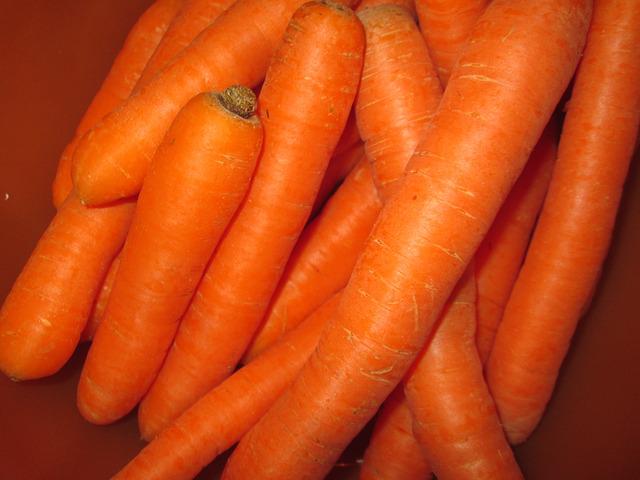Are carrots good for your eyes? Yes, in certain situations, the minerals in this well-known root vegetable can aid in promoting eye health. But it’s a little more complicated than that. Even though carrots do contain minerals vital for our eyes, increasing your intake is unlikely to improve your vision. The belief that carrots are beneficial for vision dates back to World War II when the British Ministry of Food launched a propaganda campaign claiming that a diet high in carrots was the key to the British Air Force’s victory against German aircraft. The Ministry also urged citizens to eat more carrots to improve their night vision so they could see better during blackouts.
Table of Contents
Relation Between Carrots And Eye Health
For a long time, people have believed that eating carrots can promote eye health and improve eyesight, especially at night.
Although this is true, the connection between carrots and vision stems from a myth.
During World War II, RAF pilots first began to use radar to aim and shoot down enemy aircraft. In order to keep the secret of this new technology, the visual accuracy of pilots – especially at night – is believed to be related to eating carrots.
This led to a long-term campaign to promote that carrots can improve vision. This link between eating carrots and improving night vision continues to this day.
However, although they are not magical eye foods as advertised during World War II, carrots do contain certain compounds that are beneficial to the eyes.
Carrots Are Rich In Antioxidants
Carrots are rich in β – Carotene and lutein, which are antioxidants, can help prevent eye damage caused by free radicals.
Free radicals are a kind of compound. When their quantity is too high, they will lead to cell damage, aging and chronic diseases, including eye diseases.
Carotene is the pigment of many red, orange and yellow plants. Orange carrot β – The content of carotene is particularly high, and your body will convert it into vitamin A. Vitamin A deficiency can lead to night blindness, and vitamin A supplementation can usually cure it.
The formation of rhodopsin requires vitamin A. rhodopsin is a red purple photosensitive pigment in eye cells, which helps you see at night.
Eating cooked carrots can be absorbed and utilized more effectively than eating raw carrots β – Carotene. In addition, vitamin A and its precursors are fat soluble, so eating carrots containing fat can promote absorption.
Yellow carrots contain the most lutein, which may help prevent age-related macular degeneration (AMD), a disease in which vision is gradually blurred or lost.
A diet rich in lutein may have a special protective effect on macular degeneration.
How Much Carrots Are Necessary?
According to research, it is not clear how many carrots a person needs to eat to improve their night vision. Most studies have focused on β – Carotene or vitamin A supplements, not specifically for carrots. A randomized controlled study in 2005 compared different food choices rich in vitamin A, which may help solve night blindness in pregnant women. The results showed that eating 4.5 Ounces of carrots on a regular basis every six days helped women return to normal levels of response to darkness.

However, some studies have shown that, β – Carotene will not be converted into vitamin A, so people should take supplements. Besides, eating too many carrots is not good for your eyesight. When you have enough β – When carotene is used, it will not be converted into vitamin A. The body will react naturally to the excessive production of vitamin A to prevent the accumulation of toxic substances.
Eat carrots if you like. Eating green leafy vegetables rich in lutein and zeaxanthin, such as spinach and cabbage, can also help improve and protect your eyesight.
In addition to the correct diet, you can also keep your eyes healthy through daily eye examination. At Joel mcgahen, OD, we are your local and leading eye care provider. We offer a wide range of treatment options for vision problems, including special glasses and contact lenses.
Can Eat More Carrots Improve Night Vision?
Carrots are rich in β – Carotene, exactly β – Carotene gives this vegetable an orange color, which our body converts into vitamin A. The eyes need vitamin A to convert light into signals and send them to the brain, so that we can see more clearly in a dark environment. However, most Americans consume large amounts of β – Carotene, no need to eat extra carrots to improve vision. In fact, when you have enough β – When using carotene, eating a lot of carrots will not help your eyesight much, because the body will remove excess vitamin A, and excess vitamin A will be toxic. But for those who do lack vitamin A (such as children in developing countries), vision may be affected. It is estimated that 250000 to 500000 children are blind due to vitamin A deficiency every year. Vitamin A supplements have been shown to improve night vision in some parts of the world where this condition is widespread.
Other Food That Can Protect Eyes And Prevent Vision Loss
It is true that a healthy diet is good for our eyes, but rather than eating only one food (such as carrots), it is better to eat more fruits, vegetables and other foods rich in vitamins and antioxidants. Especially green leafy vegetables, such as spinach, kale, broccoli and kale, are rich in nutrients (including lutein and zeaxanthin), which can protect your eyesight and even prevent some eye diseases, such as age-related macular degeneration. In addition, eating foods rich in omega-3 fatty acids, such as walnuts and salmon, is good for your eyes and body. In the United States, most vision problems are the result of heredity, aging or diabetes. Therefore, generally speaking, it is the best way to enjoy all kinds of healthy food and maintain the health and nutrition of the whole self, rather than focusing on one food or even a group of food. Checking your eyes regularly is also one of the best ways to protect your eyes and health. Your ophthalmologist is a good resource to help you understand which lifestyle choices (such as better nutrition and more exercise) may be beneficial to your vision, depending on your personal situation. Arrange your eye examination today.
Read about Do Edibles Make Your Eyes Red?
Conclusion
Did your mother ever say that if you didn’t eat your vegetables, you would need glasses? You may have eaten your carrots, but her incentive strategies were dubious. Your vision was unaffected by the extra carrots if you were eating a normal balanced diet. However, the relationship does make sense. Beta-carotene, which is found in carrots, is converted by your body into vitamin A, which is necessary for good vision. However, a very small amount is required to keep your vision sharp. Only if your body is vitamin A deficient will foods high in beta-carotene and vitamin A affect your vision.





